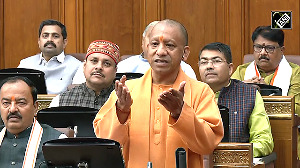The Bharatiya Janata Party has fought few state elections in recent times with such organisational firepower and ideological fervour as it did the Delhi polls, but this all came to nought as the party suffered a big loss, a defeat that continues its poor run in state elections since 2018.

The only consolation for the party, which several of its leaders keenly pointed out, is that its vote share increased to more than 38 per cent this time from 32 in 2015. This is the most votes it has got in the city after it came to power in 1993 with nearly 48 per cent votes.
The rise in the BJP's tally, likely to be eight with results yet to be announced in some of them, from three is unlikely to gladden many hearts in the party whose president J P Nadda had expressed confidence of crossing the mark of 45 in the 70-member assembly.
Incidentally, this is the first state poll the party fought under Nadda.
Chief Minister Arvind Kejriwal-led Aam Aadmi Party showed ideological flexibility to dent the saffron agenda of Hindutva and national security and its governance model built around welfarism, and investment in education and health sectors ensured that a whopping 54 per cent of voters backed it in the polls.
Kejriwal's support to the Modi government on issues like the nullification of Article 370 and muted opposition to the Citizenship (Amendment ) Act even as he spoke against the inconvenience caused by the Shaheen Bagh protest, ensured that the BJP's shrill attempt to paint him to be working against the "interests" of Hindus and the country did not cut much ice.
The loss will rankle more with the BJP's ranks as its entire organisational might led by home minister and its former president Amit Shah worked overtime to oust the AAP from power.
Over 300 of its MPs, including several Union ministers, intensively campaigned in the city's 70 assembly constituencies but in vain. Prime Minister Narendra Modi addressed two poll rallies.
Putting up a brave front, BJP general secretary Kailash Vijarvargiya noted that the BJP's vote share has risen to 38 per cent and coupled with its allies Janata Dal-United and the Lok Janshakti Party this was close to 40 per cent.
Though there will be questions about the BJP's high-decibel campaign, which the opposition said was divisive and polarising, several leaders within the party asserted that the defeat was not due to but despite this.
"Our vote share could have plummeted as the AAP had a huge lead over us when we began our campaign. It is our ideological drive that charged saffron cadres and energised out support base," a party leader closely associated with the electioneering said.
The BJP's biggest drawback, many believe, was a lack of credible local leadership to take on Kejriwal, who enjoyed unmatched advantage in this regard. With Modi as its face in the 2019 Lok Sabha polls, the party had won near 57 per cent votes and bagged all seven seats.
Its initial assessment suggests that the party's campaign swayed a sizeable chunk of middle class voters but failed to counter its rival's appeal among the poor and lower middle class.
Since 2018, the BJP has failed to win a majority in any of the state polls.
It lost power in Madhya Pradesh, Rajasthan and Chhattisgarh in 2018 followed by Maharashtra and Jharkhand. The party managed to form government in Karnataka by winning over opposition MLAs and in Haryana by allying with a regional party.
The huge gap in BJP's votes in the Lok Sabha and assembly polls in states like Jharkhand, Haryana and now in Delhi makes it clear that a large number of its voters have switched their preference in regional elections.











 © 2025
© 2025